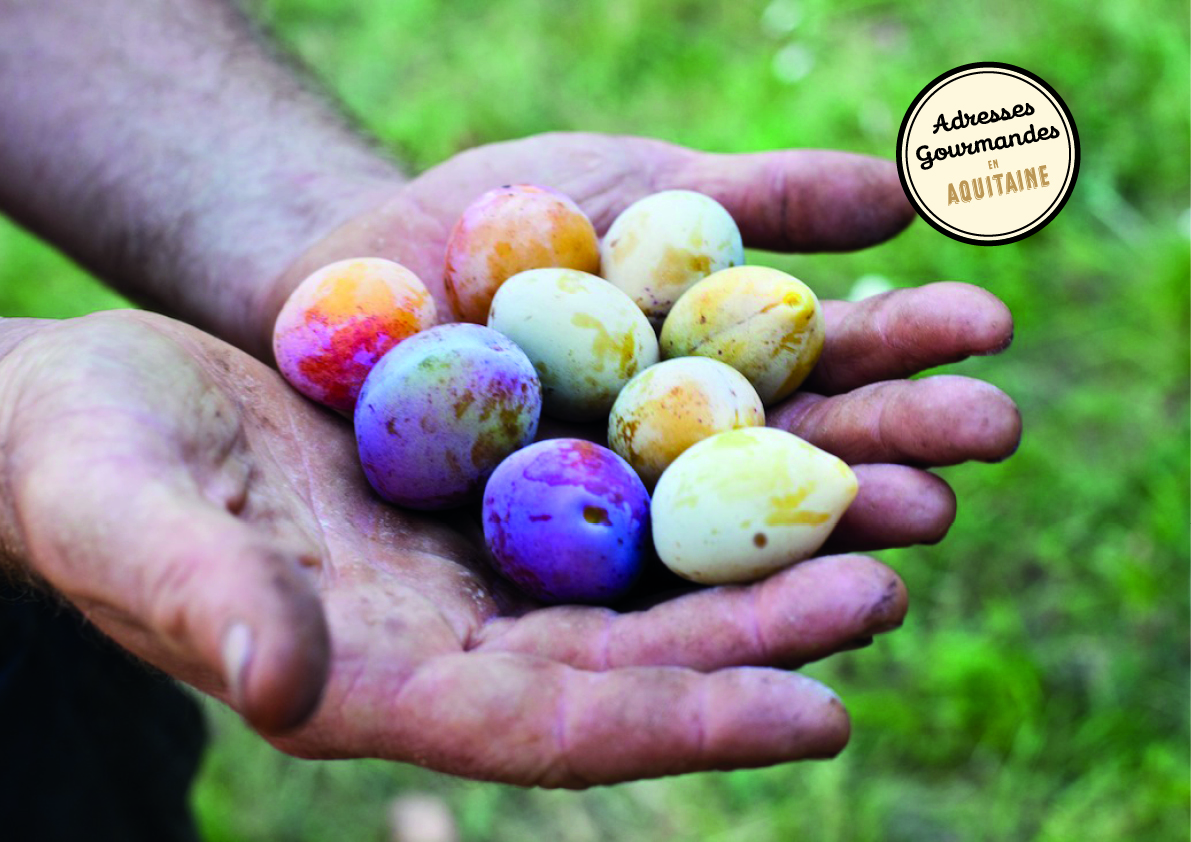
Jacquou’s magnificent orchard
By Guélia Pevzner
The Jacquou farm is hidden away, deep in the Périgord countryside, halfway between Bergerac and Sarlat. The roads wind tortuously towards Bugue, one of which fords the Dordogne and takes you to the village of St Chamassy. The first place to stop in this little village of 530 inhabitants is its 15th century church. The sun is setting behind the adjacent hill, some rough stone houses with their gardens and old plum trees tempt passers-by with their fruits, there is that rare and happy feeling here of time standing still.
The farm is not far off, just at the entrance to the village. Benoit Ménard works there alone. A native of St Chamassy, he is the fifth generation of his family to farm in the area. With his ponytail he looks more like a cattle rancher and it is not quite what is expected in a rural environment where a beret would perhaps be more in keeping.
And yet he is no slacker when it comes to honouring the old traditional ways: the 85 lambs roam around the orchard enjoying the fruits that fall from some 960 trees. They are all old heritage varieties chosen with the aid of the Aquitaine Conservation Society: 40 varieties of cherry, 42 pears, 80 apples, 25 peaches, but also medlars, nectarines, chestnut and walnut trees, apricots and quinces, and many others. The farm’s orchard is part of a venture to reintroduce these long-neglected fruit trees to the land as part of the countryside heritage that merits protection.
‘I wanted to plant the orchard with avenues of trees that grow naturally’
. No need to ask if the plantations are organic, from the distances between the trees and their branches heavy with fruit, it is abundantly clear that everything is in harmony with the natural environment. ‘I wanted to plant the orchard in the standard way like they used to do, directly in the fields without irrigation, and with each tree fairly isolated. There are still many orchards like that in Switzerland and even here in France, in Normandy. The choice of organic farming also applies to the trees as well as the animals. The trees are going to need three to ten years before they begin to produce normally and they will grow very big, but they will also have a longer and more productive life. The lambs are fed with the hay from my own fields and with the cereals that I grow here. It is only in December when the lambing season begins that the flock is brought indoors. When the spring comes they will be out in the fields again.’
White strawberries at the foot of the raspberry canes.
The market garden, which covers 200 m2, is also designed to grow old varieties, and in summer, the stars of the crop are the white strawberries. The layout of the mounds ‘on shelves’ helps with picking, they are almost at man height. Biodiversity is at work here, the vegetables are planted at the foot of the raspberry canes, kiwis and blueberries. Benoit Ménard quotes ‘The natural garden’ a book by Jean-Marie Lespinasse which first inspired him to invest in this enterprise.
‘The demand is set to grow’
The decision to go organic was also dictated by financial circumstances, even if Benoit is firm in his conviction that natural methods are the best. ‘With conventional production you have to sell in bulk and accept the price offered. Thirty cents a kilo for apples that are sold at 1.50 euros in the shops, it seems to me that there is a calculation problem. With organic production, I decide the price.’ Benoit is convinced that demand for his farm products will grow: ‘All the questions that people are asking about food health and safety, will lead to a more healthy, more natural agriculture’. For the moment, he is not short of customers. Benoit sells his fruits and vegetables, and the lamb meat directly on the farm and in the Bugue local farm shop. His produce can also be found in July and August in the evening markets.
The Jacquou sheep farm
La Bouriette
24260 Saint Chamassy
Tel : +33(0) 621 756 204
An article published as part of the Gourmet Addresses application